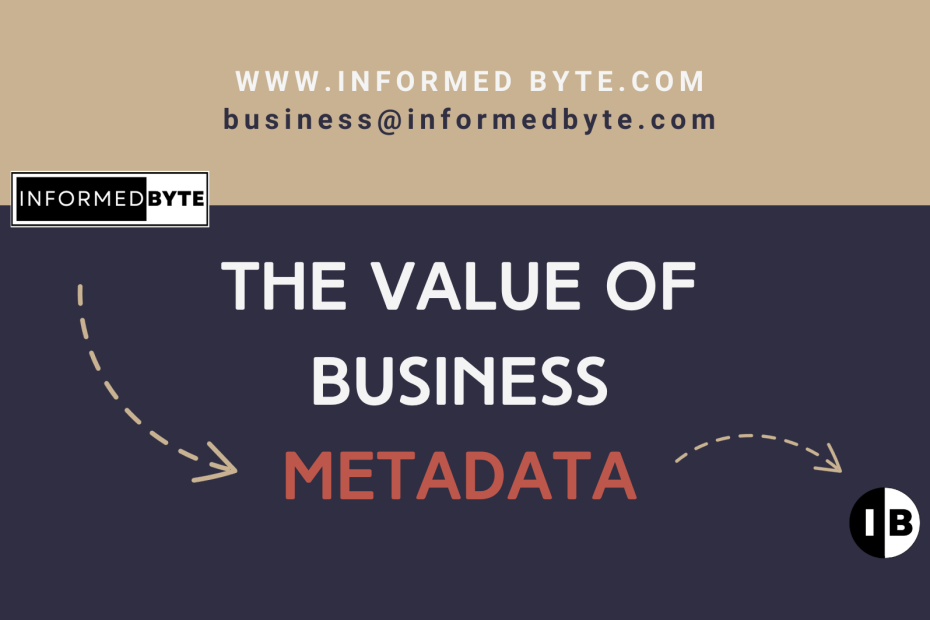The Value of Business Metadata
September 18, 2023

Unveiling the Hidden Treasure
In today’s data-driven world, organisations are constantly striving to gain a competitive edge through data analytics, artificial intelligence, and machine learning. However, the sheer volume and complexity of data have made it increasingly challenging to harness its true potential. In this context, business metadata emerges as an invaluable asset, providing the necessary context and structure to transform raw data into actionable insights.
Understanding Business Metadata
Business metadata refers to the data that describes other data within an organisation. It includes information about the source, purpose, format, relationships, and usage of data. While technical metadata focuses on the technical aspects of data storage and management, business metadata adds a layer of meaning, making it accessible and interpretable to non-technical stakeholders. The value of business metadata lies in its ability to bridge the gap between data and decision-making, enabling organisations to extract meaningful insights, reduce risks, and enhance overall operational efficiency.
Case Study 1: Financial Services (expert: Jane Smith, Data Analyst at a leading investment firm)
Jane Smith’s role as a data analyst at a prestigious investment firm revolves around making investment decisions based on market trends and financial data. She explains how business metadata has transformed their data-driven strategies.
“Our firm manages vast amounts of financial data from various sources, including stock exchanges, economic reports, and client portfolios. Previously, we struggled to keep track of data sources and the accuracy of the information. With the implementation of robust business metadata, we can now confidently trace the origin of data, its update frequency, and its relevance to specific investment strategies. This level of transparency has minimised errors in our analysis and improved our decision-making process”.
In this case, business metadata aids in tracking the lineage and relevance of data, reducing the risk of erroneous financial decisions. “Business metadata is like having a roadmap for our data journey. It helps us navigate through the complexity of financial data and make informed investment decisions”.
Case Study 2: Retail (expert: David Johnson, Chief Data Officer at a major retail chain)
David Johnson, a seasoned data professional, discusses the pivotal role business metadata plays in the retail sector.
“Retail is all about understanding customer behaviour and preferences. We collect data from multiple channels, such as online transactions, in-store purchases, and social media interactions. To gain a holistic view of our customers, we needed to integrate and analyse data from these diverse sources. Business metadata provides the necessary information to ensure data quality and consistency. We can now create a comprehensive customer profile, enabling us to offer personalised recommendations and promotions, ultimately boosting sales”.
In the retail industry, business metadata assists in creating a unified view of customer data, facilitating targeted marketing and enhancing customer satisfaction.
“Retailers must stay ahead of customer trends. Business metadata empowers us to harness the full potential of our data, creating personalised shopping experiences that keep customers coming back”.
Case Study 3: Healthcare (expert: Dr. Emily White, Chief Medical Informatics Officer at a Leading Hospital)
Dr. Emily White discusses how business metadata revolutionises healthcare data management.
“Data accuracy and timeliness can be a matter of life and death. We rely on electronic health records (EHRs) to provide critical patient information to clinicians. With business metadata, we can tag patient data with relevant information such as diagnosis codes, treatment history, and physician notes. This contextualisation allows doctors to make faster and more accurate decisions, leading to improved patient outcomes”.
In healthcare, business metadata ensures the quality and accuracy of patient data, enhancing the quality of care and patient safety. “Data can literally save lives. Business metadata ensures that patient data is accurate and accessible when needed, enabling us to provide the best possible care”.
Are you gaining value from your metadata?
Whether it’s in financial services, retail, healthcare, or any other sector, business metadata empowers organisations to harness the true potential of their data. It enhances data quality, reduces risks, supports informed decision-making, and ultimately drives business success. As organisations continue to navigate the data-driven landscape, the importance of business metadata cannot be overstated. It is the key to unlocking the hidden treasure trove of insights hidden within data.

